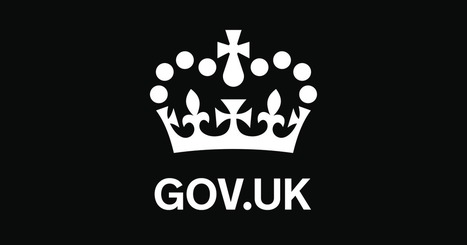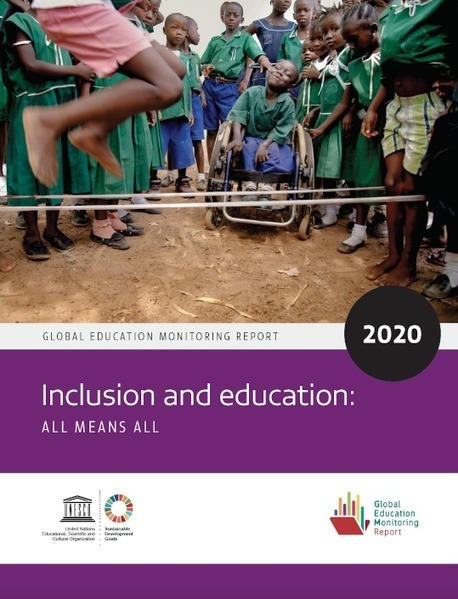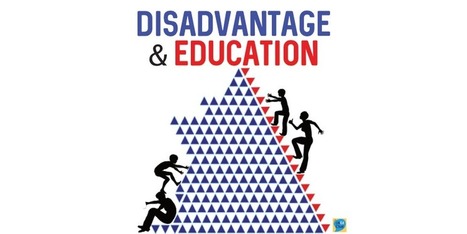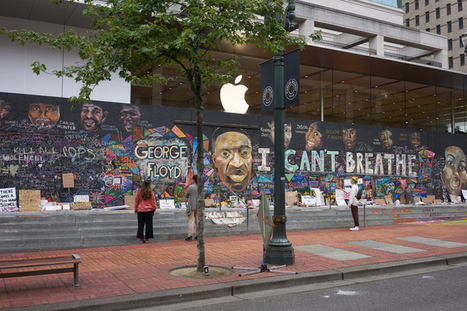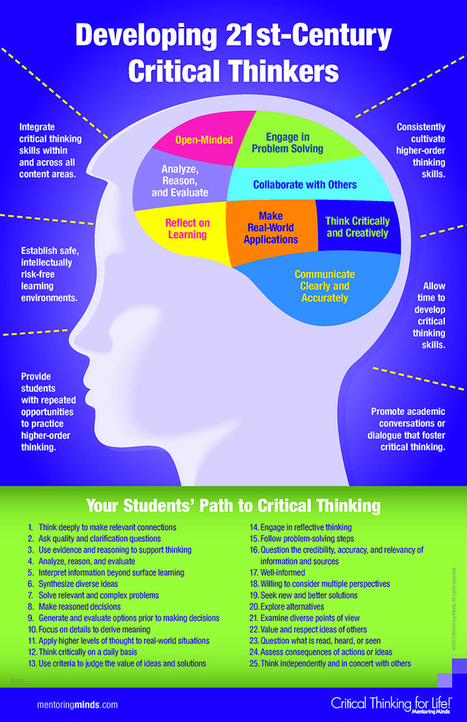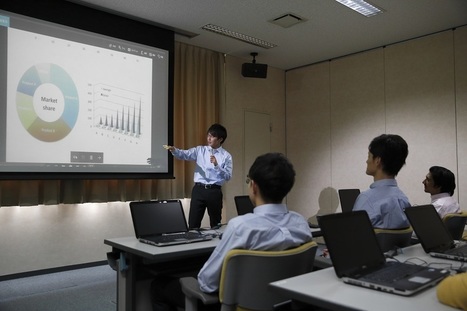A recent HEPI blog written by Professor Doug Stokes argues that the decolonisation movement in higher education is ‘illiberal and authoritarian’, describing recent comments from the Minister of State for Universities that decolonisation is ‘censoring history’ as ‘a defence of key academic values’. While we certainly respect the author’s right to freely express their opinions, we believe the blog perpetuates several fundamental misunderstandings about curriculum decolonisation that should be addressed.
Get Started for FREE
Sign up with Facebook Sign up with X
I don't have a Facebook or a X account

 Your new post is loading... Your new post is loading...
 Your new post is loading... Your new post is loading...
Current selected tag: 'education'. Clear
Information, guidance and support for teachers and leaders on educating children during the coronavirus outbreak.
In line with its mandate, the 2020 GEM Report assesses progress towards Sustainable Development Goal 4 (SDG 4) on education and its ten targets, as well as other related education targets in the SDG agenda. The Report also addresses inclusion in education, drawing attention to all those excluded from education, because of background or ability. The Report is motivated by the explicit reference to inclusion in the 2015 Incheon Declaration, and the call to ensure an inclusive and equitable quality education in the formulation of SDG 4, the global goal for education. It reminds us that, no matter what argument may be built to the contrary, we have a moral imperative to ensure every child has a right to an appropriate education of high quality.
However, there are a nu
The Higher Education Policy Institute (www.hepi.ac.uk) is publishing a landmark report, Postgraduate Education in the UK (HEPI Analytical Report 1) by Dr Ginevra House, which has been produced with the kind support of the British Library.
Changes in the educational field require a change of mindset first. In this article, find out how technology can transform the future of education. Via EDTECH@UTRGV
Steven Orjuela Garcia's curator insight,
February 19, 2020 10:02 AM
I find this article quite interesting, as it serves as a reminder that as teachers we need to keep innovating the way we educate. We can't keep using the same archaic methods from the last century, by using technology we can achive bigger advances in not only investigation but also education.
Daniela Ibarra Osorio's curator insight,
March 15, 2020 4:37 PM
Education has had a fairly notable evolution with the use of technology, recognizing that there are differences that characterize each individual and that by recognizing these differences we understand inclusion and along with it goes the technology that supports us to change in order to generate significant changes and challenges in learning, content, proximity and teaching. The future of education lies in teaching about creativity, innovation, problem solving and understanding that we are and are going for an era of evolution. 
thelma.davila@yahoo.com's curator insight,
September 19, 2021 12:34 AM
The article focuses on transforming the current educational system that was implemented in the 1900's using new technology integration. Technology has the ability to use differentiation in each individual student.
The 2020 list of EDUCAUSE’s Top 10 IT Issues provides evidence that the higher education IT community is increasingly focused on using technology to better understand students and rethink systems, culture and process to improve student success. This focus is especially critical when it comes to using student data to improve retention and completion rates. To develop the capabilities and systems that can provide students with personalized, timely support, institutions need to understand how data technology, such as predictive analytics, can address the factors that lead to student success. They also must know how to use information from institutional data to introduce changes that promote sustainable, effective and efficient practices, while considering students’ experiences and needs as their starting point.
With the rise of artificial intelligence (AI), machine learning and cloud computing, the nature of work is transforming. The workplace is changing, raising fundamental questions about what it means to be a worker, and how to have a fulfilling career. While many focus on the possible downsides of these changes, like whether AI will displace millions of workers, we’d like to reframe the conversation and focus on the skills and workforce necessary for the (present and) future of work.
I was at a posh event in London last week, hosted by the Open University (I even wore a tie, people!). It was launching an OU report “Bridging the Digital Divide” which looks at some of the skills gaps in employment and how education can address these. It’s a good report, which avoids the trite “60% of jobs haven’t been invented yet” type statement and builds on some solid evidence.
AI is arguably the number one driving technological force of the first half of this century, and will transform virtually every industry, if not human endeavors at large,” said Charles Fadel.
Fadel is the founder of the Center for Curriculum Redesign and has a new book on Artificial Intelligence in Education. He wrote it with his research manager Maya Bialik and Dr. Wayne Holmes, Open University.
“We have tried addressing the impact of AI on both the What and the How of education,” said Fadel.
In the week when the OECD published their latest report, noting that educational disadvantage starts from the age of 10 (click here to read the story) across many countries, and widens throughout students’ lives, it is clear that many societies still have a lot to do. Whether the disadvantages are down to family circumstance, race, gender (identification), wealth and socio-economic background, or a distinct lack of opportunity and belief in oneself – what can education and educators do to help bridge the divide that allows opportunities for some, more than others?
From
zenodo
Key Points
Digital credentials that shows precisely which skills a job applicant has obtained are more accessible and will become increasingly relevant, he says. Via EDTECH@UTRGV 
Marco Bertolini's curator insight,
March 1, 2019 6:50 AM
Alternative credentials will transform higher education, warns UC Irvine Dean |
A once in a lifetime pandemic. A once in a lifetime opportunity. Teaching in the year 2020 reminds me of a quote from “Inherit the Wind:” “Perhaps it is you who has moved away by standing still.” All at once our world was completely halted by a global pandemic the worst in 100 years and yet in a moment of crisis an opportunity to create appeared. Are we going to move away from progress by standing still? Via EDTECH@UTRGV 
EDTECH@UTRGV's curator insight,
December 23, 2020 1:18 PM
Let's make the most of the opportunity the COVID-19 pandemic has presented education around the world.
"COVID-19 has not only shaken up the way we deliver instruction, but the pandemic also threatens the bonds that connect students to each other and their campuses." Via EDTECH@UTRGV
This blog was kindly contributed by Kalwant Bhopal, who is a Professor of Education and Social Justice, the Director of the Centre for Research in Race & Education (CRRE) and BAME Academic Lead, in the School of Education at the University of Birmingham.Her recent book, ‘White Privilege: the myth of a post-racial society’ was published by Policy Press.
On Thursday, HEPI will be publishing its first major paper on decolonising curricula.
The protests against the murder of George Floyd by police in the USA have been widely noted as marking a significant ‘moment’ in the history of race relations, not just in the United States but across the globe. The problem of such ‘moments’ is that we have seen so many of them before. #BlackLivesMatter itself was a response to a previous ‘moment’, the killing of Trayvon Martin in Florida. In the UK, the racism of police officers to cover-up the murder of Stephen Lawrence was another such ‘moment’.
Author: Isabel Drury, Partnership Manager According to UNESCO, more than 1.5 billion students and 63 million primary and secondary teachers have been ...
Aiden Warren-Farrell's curator insight,
June 3, 2020 8:52 PM
This resource provides detail into how to develop critical thinking students who are use problem solving methods and develop high order thinking skills.
Andrew Harrison's curator insight,
June 4, 2020 3:53 AM
With the abundance of information available to adolescence it is essential Teacher's encourage the development of critical thinkers. This article proposes some ideas for students to develop critical thinking.
Breanna Schmidt's curator insight,
June 6, 2020 7:05 AM
There is bucket-loads of information available to an adolescent it is essential for us teacher to encourage students to develop critical thinking skills. This article attached shows a few ideas of how to create critical thinkers within the classroom environment
There have been many changes in the development of national and world education. The most observable phenomenon is now the internalization of society and the penetration of digital technologies into learning. Education has traditionally been seen as a pedagogic relationship between the teacher and the student. Pedagogy, the art of science and teaching the child, embodies a teacher-focused education where the teacher dominates the classrooms. This approach assumes the teacher being the repository of knowledge and taking full responsibility about what the learner needs to learn when it is to be learned, and indeed how it should be learned. This pedagogical slant develops the role of the student to be a dependent one and the relationship between the student and his/her peers as a competitive one. Pedagogical learning is purely based on the possession of skills and knowledge through transmittal techniques, such as lectures, demonstrations, textbook reading, audiovisual presentations and examinations. Students are motivated to learn due to external pressures such as competition for securing higher grades, fear of failure and at times due to fear of punishment. Learning is confined to a pre-planned curriculum for all students so that it can easily be monitored and evaluated. It addresses the issue of what is to be learned “The Content”, and not how it is to be learned “The Process”.[1]
"The Internet of Things (IoT) has changed everything in almost every sector of industry and community, and nowhere is that more apparent than in the educational sector. From small improvements to school creature comforts to massive technological rethinks which have changed the way certain schools operate, the Internet of Things is leaving an indelible imprint on education as a whole." Via EDTECH@UTRGV
One of the rewarding parts of working in education is that for the most part, people really want to be as collaborative and open as possible. Many organizations are doing valuable work collecting and sharing data on innovative schools for others in the field to learn from. By publishing this data, these organizations democratize access to information, which combats the inefficiency and exclusivity inherent in the word-of-mouth school discovery method. At least a dozen databases and lists (and likely more that we’re not aware of) have cropped up in the last few years to elevate stories and share data on innovative practices and school models.
Sociologists of education argue that “curriculum” is a highly ideological hybrid discourse. This means that it includes implicit ways of knowing, ways of doing and ways of being – as well as content.
From
wonkhe
If we are to be honest, most university mission statements are largely interchangeable and somewhat bland.
The #OpenBlog19 challenge created by David Hopkins is sparking a series of posts where educators go on to challenge others to write a blog in answer to a given question. Steve Wheeler challenged me to write about 'What's wrong with education'.
As an educator, you strive to mould your students into bright, responsible individuals.
For years, we’ve been prioritizing stability and security over interests when it comes to choosing a career. Up until a few years ago, the career you chose wasn’t likely to evolve at the frenzied pace it is currently going through. Today, the Technological Revolution is well underway and changing the way we approach jobs. A study by the World Economic Forum revealed that by 2022, nearly one-fifth of the world’s workforce will feel the impact of AI-related advancements in their workplace. Does it still make sense to prioritise ‘stability’ over interests, when just about every career could drastically transform thanks to technological advancements? |





